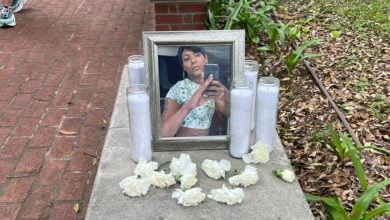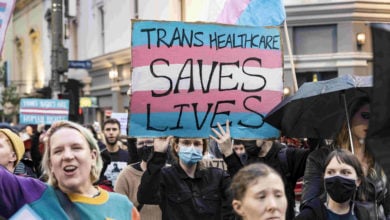The first Trans March in Albuquerque’s history took place on May 29 as part of this year’s Pride activities. Organizers of the march said that Albuquerque was the second city in the South West region, and only the eighth city in the United States and Canada to organize a Trans March.
Over 100 people rallied and marched to celebrate the strength of the community and bring awareness to transgender discrimination and violence. The march started at the Transgender Resource Center of New Mexico, which initiated the march, and ended at Morningside Park, where it merged with the ABQ PRIDE candlelight vigil.
Events like Albuquerque’s 2014 Trans March are instrumental in shedding light on the rampant discrimination the trans community faces in every area of life. A 2011 study involving 6,450 transgender and gender non-conforming participants revealed, along with hundreds of other findings, that, “Those who expressed a transgender identity or gender non-conformity while in grades K-12 reported alarming rates of harassment (78%), physical assault (35%), and sexual violence (12%).” This led one-sixth to leave school altogether. A staggering 41% of respondents reported attempting suicide, compared with 1.6% for the general population.
Many esteemed speakers from Albuquerque’s trans community spoke and shared their personal struggles, losses and participation in the trans rights movement, which has grown considerably in recent years. Longtime activist Janice Devereaux remarked, “Ten years ago I never thought I would have seen this, I never thought I would live to see (this). Ten years ago when I got started the world was very different.”
Paula Kaski, one of the coordinators of the march said, “I’m a little choked up because I told everybody if we got 20 people, this would be a success, and we’ve got at least triple that!”
Amongst those attending were various social justice groups including students from the University of New Mexico, activists from Women Organized to Resist and Defend, City Council member Ray Garduno and a diverse array of community members.
Virginia Stephenson, who has worked tirelessly for an end to anti-trans discrimination in NM pointed out the reality of trying to fight discrimination through the legal system: “If you go to a healthcare provider, an educational institution, a government entity . . . we still are in danger of being mistreated and having unfair treatment of service. In fact we are also in danger of being taken advantage of because the process by which we resist unfair treatment is very tedious and very complicated.”
The diversity in the crowd, as well as the among speakers spoke true to New Mexico and fostered a sense of over all interconnectedness. Mattie Jim, a Native American trans woman shared a thank you to Mother Earth before speaking, and pointed out the diversity with delight: “I am honored to be up here talking to you, I see Native representation in the audience and I love that . . . you make this a wonderful feeling for me, coming from my community, because I am very attached to my community back home. Also being from the reservation, it’s a great experience”
The weight of the growing numbers of trans marches around the country is due to years of struggle. This year’s Pride activities mark the 35th anniversary of the Stonewall Rebellion in New York City, which is considered widely to be the origin of the LGBTQ movement in the United States. Transgender individuals are recognized for their militant involvement and leadership during the three-day rebellion at Stonewall.
However, four years earlier in San Francisco, a less recognized, but equally important rebellion known as the Compton’s Cafeteria Riot took place. Trans people in the Tenderloin District poured out into the streets to combat the police in the first act of collective resistance to police brutality by the trans community on record.
Bearing in mind the history of LGBTQ oppression and isolation, as well as the strides that brave individuals have made to change this system of oppression, this first trans march in ABQ is a huge step. Those involved have no intention of retreating, and plan to make this an annual march.
Adrien Lawyer, executive director for the TGRCNM eloquently summed up the importance of the historic march in the broader struggle for social justice: “Transgender folks have always been there linking arms with every other social justice movement, so the trans marches are also about just speaking out against violence and oppression in every form, not just as it pertains to transgender people but as it pertains to everyone in this world. How are we going to be part of changing the world to be more socially just, more racially just, more economically just? Until everyone is equal, until everyone is free, none of us are truly free!”






